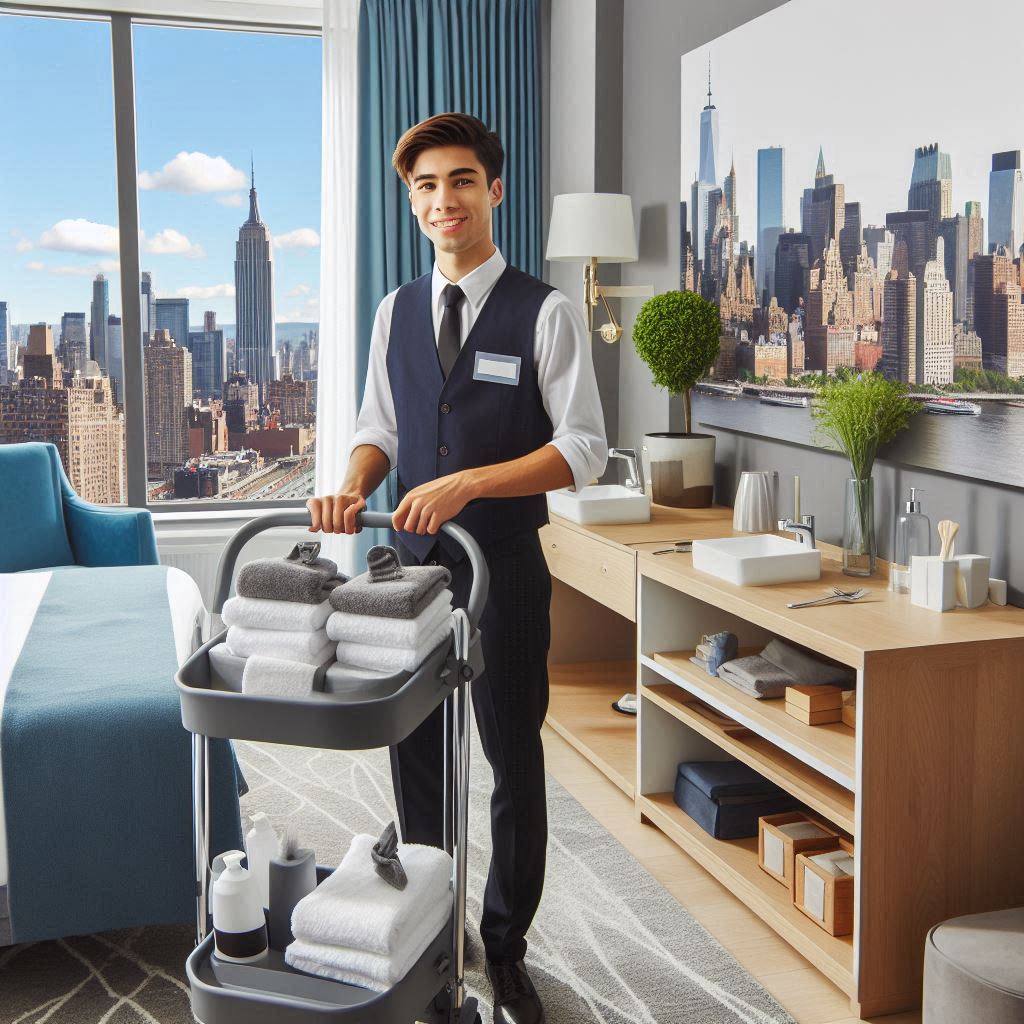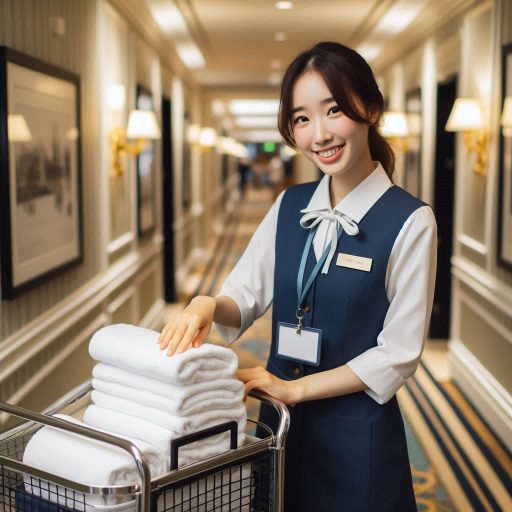Introduction
Housekeepers and room attendants play vital roles in the hospitality industry.
Both positions ensure a clean and welcoming environment for guests, which is essential for a positive guest experience.
Their contributions significantly impact customer satisfaction and uphold the establishment’s reputation.
However, there are key differences between these two roles that are worth exploring.
Housekeepers typically manage multiple rooms and oversee cleaning operations for entire floors or sections of a hotel.
They coordinate laundry services, inventory supplies, and ensure that all areas maintain high cleanliness standards.
Their responsibilities often extend beyond room care, as they may also handle scheduling and training of staff.
In contrast, room attendants focus on cleaning individual guest rooms.
They ensure that beds are made, bathrooms are spotless, and amenities are replenished.
While both roles require attention to detail and a commitment to cleanliness, their specific responsibilities differ significantly.
Understanding these distinctions helps clarify their contributions to a hotel or resort.
Recognizing their unique functions fosters better teamwork and efficiency within the hospitality sector.
By appreciating the differences between housekeepers and room attendants, hospitality professionals can enhance operations and improve guest experiences.
Job Responsibilities of Housekeeper
Housekeepers play a vital role in the hospitality industry.
They ensure that rooms are clean and comfortable for guests.
Their responsibilities focus primarily on cleaning and maintaining the rooms.
Cleaning and Maintaining the Rooms
Housekeepers clean and maintain the rooms to a high standard.
This includes dusting furniture, vacuuming carpets, and mopping floors.
They pay close attention to bathrooms, ensuring they are spotless and sanitary.
Housekeepers often work quickly but efficiently to complete their tasks within a set timeframe.
Changing Bed Linens and Towels
One of the primary tasks is changing bed linens and towels.
Housekeepers replace used sheets and pillowcases with fresh ones.
They carefully fold towels and arrange them neatly in the bathroom.
This attention to detail contributes to a welcoming environment for guests.
Replenishing Amenities Such as Toiletries
In addition to linens, housekeepers replenish amenities such as toiletries.
They ensure that items like soap, shampoo, and conditioner are fully stocked.
This includes replacing used items and checking for any deficiencies.
Housekeepers also inspect for any needed repairs or replacements, reporting them to the appropriate staff.
Ensuring the Room Is Clean and Comfortable for Guests
Housekeepers maintain cleanliness in public areas, such as hallways and lobbies.
They may also be responsible for cleaning common facilities, like gyms and pools.
Their work contributes to the overall atmosphere and hygiene of the hotel.
Attention to detail is crucial in a housekeeper’s role.
They must ensure that every corner of the room meets the hotel’s standards.
This includes checking for dust, dirt, and any signs of wear and tear.
Housekeepers often take pride in their work, knowing that a clean room enhances guest satisfaction.
Effective time management is essential for housekeepers.
They must complete their tasks efficiently within a limited timeframe.
Each housekeeper typically has a set number of rooms to clean per shift.
Balancing speed with quality is a key part of their responsibilities.
Communication is another important aspect of a housekeeper‘s job.
They often interact with other hotel staff and guests.
Housekeepers should report any issues they encounter during their cleaning tasks.
This ensures that any problems are addressed quickly, enhancing the guest experience.
Housekeepers also play a role in creating a welcoming environment.
They may arrange furniture and d‘cor to ensure a pleasant appearance.
Their work often involves personal touches that make a difference for guests.
A well-made bed and neatly arranged room can significantly impact a guest’s stay.
Housekeepers have diverse responsibilities that contribute to the hotel’s success.
They focus on cleaning and maintaining rooms, changing bed linens, replenishing amenities, and ensuring guest comfort.
Their efforts are crucial in providing a pleasant experience for every visitor.
A dedicated housekeeper plays an essential role in fostering a positive impression of the hotel.
Read: How to Handle Emergency Situations in Pet Grooming
Job Responsibilities of Room Attendant
Room attendants play a crucial role in the hospitality industry.
They focus on maintaining a high standard of cleanliness throughout the hotel.
Their responsibilities encompass various tasks that contribute to guest satisfaction.
Below are the key job responsibilities of a room attendant.
Focusing on the Overall Cleanliness of the Hotel
Room attendants are responsible for the overall cleanliness of the hotel.
This includes not only guest rooms but also common areas.
They ensure that every corner of the hotel is tidy and hygienic.
By doing so, they help create a positive first impression for guests.
Cleaning and Organizing Public Areas Such as Lobbies and Hallways
In addition to guest rooms, room attendants clean and organize public areas.
They regularly maintain lobbies, hallways, and restrooms.
This involves dusting surfaces, vacuuming carpets, and mopping floors.
Room attendants pay attention to detail to ensure these spaces remain inviting and clean.
Assisting Guests with Any Requests or Issues
Room attendants often interact directly with guests.
They assist with requests and address any issues that arise during a guest’s stay.
This could include providing extra towels or addressing maintenance concerns.
Their friendly demeanor can enhance the overall guest experience, making visitors feel valued and cared for.
Ensuring a Pleasant and Welcoming Environment for Guests
Creating a pleasant and welcoming environment is a key responsibility of room attendants.
They aim to provide guests with a comfortable and enjoyable atmosphere.
This includes arranging furniture, adding decorative touches, and ensuring rooms are well-stocked with essentials.
Their attention to detail helps foster a sense of hospitality.
Room attendants also play a role in ensuring safety and security.
They report any safety hazards or maintenance issues to management.
By doing so, they contribute to the overall well-being of guests and staff alike.
Their vigilance can prevent potential accidents and ensure a safe environment.
Effective communication is vital for room attendants.
They collaborate with other hotel staff to maintain service quality.
This includes reporting supply needs and any guest feedback.
Open communication helps ensure that the hotel operates smoothly and efficiently.
Time management skills are essential for room attendants.
They must complete their cleaning tasks promptly while maintaining quality standards.
Room attendants often work in shifts, covering multiple areas of the hotel.
Their ability to manage time effectively ensures that all tasks are completed within the required timeframe.
Room attendants have diverse responsibilities that contribute to the hotel’s success.
They focus on overall cleanliness, maintain public areas, assist guests with requests, and create a welcoming environment.
Their efforts are crucial in providing a pleasant experience for every visitor.
A dedicated room attendant plays an essential role in enhancing guest satisfaction and maintaining the hotel’s reputation.
Read: How Much Do Pet Groomers Earn in the USA?
Qualifications for Housekeeper
Housekeepers play an essential role in maintaining cleanliness and comfort in hotels and other establishments.
To excel in this position, specific qualifications are necessary.
Here are the key qualifications for a housekeeper:
Typically Requires Previous Experience in Cleaning or Housekeeping
Many employers prefer candidates with previous experience in cleaning or housekeeping.
This experience can help housekeepers understand the expectations of the job.
Familiarity with various cleaning methods and practices is crucial for effective performance.
Previous experience can also enhance a housekeeper’s efficiency in completing tasks.
Attention to Detail and Strong Organizational Skills Are Important
Attention to detail is vital for housekeepers.
They must ensure that every area is thoroughly cleaned and organized.
Even small oversights can impact guest satisfaction.
Strong organizational skills enable housekeepers to manage their time and tasks efficiently.
This helps them complete their work within the required timeframe while maintaining high standards.
Knowledge of Proper Cleaning Techniques and Products
Housekeepers should have knowledge of proper cleaning techniques and products.
Understanding which products to use for different surfaces is essential.
This knowledge prevents damage and ensures effective cleaning.
Familiarity with safety protocols for handling cleaning chemicals is also important.
Housekeepers must adhere to guidelines to protect themselves and guests.
Ability to Work Efficiently and Effectively in a Fast-Paced Environment
Housekeepers must be able to work efficiently in a fast-paced environment.
They often have a limited amount of time to clean each room.
The ability to prioritize tasks and stay focused is crucial.
Housekeepers should adapt quickly to changing circumstances, such as unexpected guest requests or last-minute assignments.
In addition to these qualifications, strong communication skills are beneficial.
Housekeepers often interact with guests and other hotel staff.
Effective communication can help resolve issues promptly and enhance the overall guest experience.
Physical stamina is also important for housekeepers.
The job requires lifting, bending, and standing for extended periods.
Housekeepers should be physically fit to handle the demands of the role.
A positive attitude and strong work ethic are essential qualities for a housekeeper.
They should approach their work with enthusiasm and dedication.
A friendly demeanor can improve interactions with guests and create a welcoming atmosphere.
In summary, the qualifications for a housekeeper include previous experience, attention to detail, knowledge of cleaning techniques, and the ability to work efficiently.
These skills contribute to the overall success of the housekeeping team.
A well-qualified housekeeper plays a crucial role in ensuring a pleasant and comfortable experience for all guests.
Read: Top Pet Grooming Conferences and Expos in the USA
Qualifications for Room Attendant
Room attendants play a vital role in maintaining the cleanliness and comfort of hotels and other hospitality venues.
To succeed in this position, certain qualifications are necessary.
Here are the key qualifications for a room attendant:
Transform Your Career Today
Unlock a personalized career strategy that drives real results. Get tailored advice and a roadmap designed just for you.
Start NowCustomer Service Skills Are Crucial for Interacting with Guests
Customer service skills are essential for room attendants.
They frequently interact with guests and must provide a friendly and helpful demeanor.
Good communication can enhance the guest experience and foster positive relationships.
Room attendants should be approachable and attentive to guests’ needs, ensuring their requests are addressed promptly.
Ability to Work Well in a Team Environment
Room attendants must be able to work well in a team environment.
Collaboration with other staff members is crucial to maintaining a clean and welcoming hotel.
Teamwork ensures that tasks are completed efficiently and that everyone contributes to the overall success of the operation.
A positive attitude towards teamwork helps create a harmonious working atmosphere.
Physical Stamina to Handle the Demands of Cleaning and Lifting
Physical stamina is important for room attendants.
The job requires lifting, bending, and standing for extended periods.
Room attendants often handle heavy linens, cleaning supplies, and furniture.
They must be physically fit to meet the demands of their duties and complete tasks effectively throughout their shift.
Attention to Detail to Maintain High Cleaning Standards
Attention to detail is crucial for maintaining high cleaning standards.
Room attendants should ensure that every area is thoroughly cleaned and organized.
This includes checking for dust, dirt, and any signs of wear and tear.
High attention to detail helps create a welcoming environment for guests and contributes to their overall satisfaction.
In addition to these qualifications, time management skills are also beneficial.
Room attendants often have multiple rooms to clean within a limited timeframe.
The ability to prioritize tasks and work efficiently is essential for success in this role.
Strong communication skills are beneficial for addressing guest requests and concerns.
Room attendants should report any maintenance issues or supply needs to management.
Clear communication helps maintain a smooth workflow and ensures that guests receive prompt service.
A proactive attitude is also valuable for room attendants.
They should take initiative in completing their tasks and addressing any challenges that arise.
This proactive approach can enhance the overall guest experience and contribute to a positive work environment.
The qualifications for a room attendant include strong customer service skills, teamwork ability, physical stamina, and attention to detail.
These skills are vital for providing excellent service and maintaining high cleanliness standards.
A qualified room attendant plays a crucial role in ensuring guest satisfaction and the hotel’s success.
Read: Educational Requirements for Childcare Workers Explained

Training for Housekeeper
Training is essential for housekeepers to ensure they meet the standards of cleanliness and service expected in the hospitality industry.
Proper training equips housekeepers with the necessary skills and knowledge to perform their duties effectively.
Here are the key components of training for housekeepers:
On-the-Job Training to Familiarize with Specific Hotel Standards
On-the-job training is crucial for housekeepers.
This type of training helps them become familiar with the specific standards of the hotel.
Each hotel has its own policies and procedures regarding cleanliness and guest service.
Housekeepers learn how to meet these expectations through hands-on experience.
They work alongside experienced staff who guide them through their daily tasks.
Instruction on Proper Cleaning Techniques and Safety Procedures
Housekeepers receive instruction on proper cleaning techniques and safety procedures.
Understanding the correct methods for cleaning different surfaces is vital for maintaining quality.
This training includes knowledge of which cleaning products to use and how to use them safely.
Safety protocols help prevent accidents and ensure a safe working environment for everyone.
Learning How to Use Cleaning Equipment and Products Effectively
Training also includes learning how to use cleaning equipment and products effectively.
Housekeepers become familiar with tools such as vacuum cleaners, mops, and cleaning chemicals.
They learn how to operate these tools safely and efficiently.
Proper training reduces the risk of accidents and damage to hotel property.
Additionally, housekeepers may receive training on time management and organization skills.
Effective time management helps them complete their tasks within the allotted time.
This training is crucial, especially in busy hotels where quick turnaround times are necessary.
Another important aspect of training is understanding customer service.
Housekeepers often interact with guests and should know how to provide excellent service.
Training in communication skills can enhance their ability to address guest needs and concerns effectively.
Regular refresher training sessions may also be beneficial.
These sessions help housekeepers stay updated on new cleaning techniques, products, and safety standards.
Continuous learning fosters a culture of improvement and enhances overall service quality.
Training for housekeepers includes on-the-job training, instruction on proper cleaning techniques, and learning to use cleaning equipment effectively.
This training ensures that housekeepers meet the hotel’s cleanliness and service standards.
A well-trained housekeeper contributes significantly to guest satisfaction and the overall success of the hotel.
Training for Room Attendant
Training is vital for room attendants to ensure they provide exceptional service and maintain high cleanliness standards.
Well-trained room attendants contribute significantly to guest satisfaction and the overall success of the hotel.
Here are the key components of training for room attendants:
Training on Customer Service and Interacting with Guests
Room attendants receive training on customer service and interacting with guests.
They learn how to engage with guests in a friendly and professional manner.
This training includes active listening skills and how to respond to guest inquiries or requests effectively.
Strong customer service skills enhance the overall guest experience, making visitors feel valued and welcomed.
Education on Hotel Policies and Procedures
Education on hotel policies and procedures is essential for room attendants.
They need to understand the hotel’s rules regarding cleanliness, safety, and guest interaction.
Knowledge of these policies helps room attendants operate within the hotel‘s standards.
It also ensures they comply with protocols related to guest privacy and security.
Familiarization with Different Areas of the Hotel and Their Cleaning Requirements
Room attendants must become familiar with different areas of the hotel and their specific cleaning requirements.
Each area, from guest rooms to public spaces, has unique standards and expectations.
Training includes learning the appropriate cleaning techniques for various surfaces and furnishings.
This knowledge enables room attendants to maintain a consistent level of cleanliness throughout the hotel.
Understanding the Importance of Maintaining a Welcoming Atmosphere
Understanding the importance of maintaining a welcoming atmosphere is crucial for room attendants.
They play a key role in creating a pleasant environment for guests.
Training emphasizes the significance of attention to detail, such as arranging furniture and ensuring cleanliness.
Room attendants learn how small touches can make a big difference in guest perception.
In addition to these core components, training may also cover time management skills.
Room attendants often have multiple tasks to complete in a limited time.
Effective time management helps them prioritize tasks and work efficiently, ensuring all areas are attended to promptly.
Safety training is another important aspect.
Room attendants must understand how to handle cleaning products and equipment safely.
This training helps prevent accidents and ensures a safe working environment for everyone.
Continuous training and professional development opportunities can further enhance a room attendant’s skills.
Regular workshops and refresher courses keep them updated on best practices and emerging trends in hospitality.
Training for room attendants includes customer service skills, education on hotel policies, and familiarization with cleaning requirements.
Understanding the importance of creating a welcoming atmosphere is also essential.
A well-trained room attendant significantly enhances guest satisfaction and contributes to the hotel’s reputation.
Delve into the Subject: How to Choose the Best Insurance Agency to Work For
Career Advancement Opportunities for Housekeeper
Housekeeping offers several career advancement opportunities for dedicated individuals looking to progress in the hospitality industry.
As housekeepers gain experience and skills, they can explore various paths for career growth.
Here are some key opportunities for career advancement within this field:
Potential to Move into a Supervisor or Managerial Role
One of the most significant career advancement opportunities for housekeepers is the potential to move into a supervisor or managerial role.
With experience and a proven track record, housekeepers can be promoted to supervisory positions.
In these roles, they oversee the work of other housekeepers and ensure that cleaning standards are met.
They also handle scheduling, training new staff, and addressing any issues that arise.
This transition allows housekeepers to take on more responsibility and contribute to the overall management of the housekeeping department.
Opportunities to Specialize in Certain Areas Such as Laundry or Housekeeping Inventory Control
Housekeepers also have the option to specialize in certain areas of housekeeping.
Specialization can lead to roles focusing on laundry management or housekeeping inventory control.
In laundry management, individuals oversee the operations of the laundry facility, ensuring that linens and uniforms are cleaned efficiently.
In inventory control, housekeepers manage the supplies and equipment necessary for daily operations.
Specializing in these areas can enhance a housekeeper’s skill set and open doors to new career opportunities.
Development of Leadership and Training Skills with Experience
As housekeepers gain experience, they can develop leadership and training skills.
Experienced housekeepers often take on the responsibility of training new staff members.
This mentorship role helps them build valuable leadership skills while fostering a supportive work environment.
Housekeepers who excel in training others may find themselves in positions that focus on staff development and training program implementation.
In addition to these opportunities, housekeepers can also pursue further education and certifications to enhance their qualifications.
Completing courses in hospitality management, cleaning technologies, or customer service can improve their chances of advancement.
These educational pursuits can provide housekeepers with a broader understanding of the industry and prepare them for more significant roles.
Networking within the industry can also play a crucial role in career advancement.
Building relationships with other professionals can lead to new job opportunities and insights into the latest trends in housekeeping.
Career advancement opportunities for housekeepers include potential promotions to supervisory or managerial roles, specialization in specific areas, and the development of leadership skills.
With dedication and continuous learning, housekeepers can build successful careers in the hospitality industry.
See Related Content: Office Clerk Salary in the Service Industry Overview
Transform Your Career Today
Unlock a personalized career strategy that drives real results. Get tailored advice and a roadmap designed just for you.
Start NowCareer Advancement Opportunities for Room Attendant
Room attendants play a vital role in maintaining the cleanliness and comfort of hotel environments.
As they gain experience and develop their skills, numerous career advancement opportunities become available to them.
Here are some key pathways for room attendants looking to advance their careers:
Progression to a Front Desk or Reservation Position
One of the exciting career advancement opportunities for room attendants is the potential to transition into front desk or reservation positions.
Their daily interactions with guests provide room attendants with valuable customer service experience.
This experience can prepare them for roles that involve managing guest check-ins, handling reservations, and addressing inquiries.
Such transitions allow room attendants to broaden their skill sets and explore different facets of hotel operations.
Potential to Become a Team Leader or Supervisor in the Housekeeping Department
Another significant advancement opportunity for room attendants is the potential to become team leaders or supervisors within the housekeeping department.
With experience and a proven commitment to high standards, room attendants can be promoted to supervisory roles.
In these positions, they oversee the work of other room attendants, ensuring cleanliness and efficiency.
They also take charge of training new staff and handling scheduling.
This progression allows room attendants to develop leadership skills and take on greater responsibility within the department.
Opportunities for Cross-Training in Other Hotel Departments for a Well-Rounded Skillset
Room attendants also have the opportunity for cross-training in other hotel departments.
This training enables them to learn about different areas, such as maintenance, food and beverage, or sales.
By gaining experience in various departments, room attendants can develop a well-rounded skill set that enhances their employability.
Cross-training fosters a deeper understanding of hotel operations and can lead to diverse career opportunities.
Continuous education and professional development can further support career advancement.
Room attendants can pursue training programs focused on hospitality management, customer service excellence, or specialized cleaning techniques.
These educational pursuits enhance their qualifications and demonstrate their commitment to the industry.
Networking within the hospitality industry is another important aspect of career advancement.
Building relationships with colleagues and supervisors can open doors to new opportunities and provide valuable insights into career paths.
Career advancement opportunities for room attendants include progression to front desk or reservation positions, the potential to become team leaders or supervisors, and opportunities for cross-training in various hotel departments.
With dedication, ongoing training, and effective networking, room attendants can successfully navigate their careers in the hospitality industry.
Explore Further: Preparing for a Baggage Handler Job Interview
Conclusion
Housekeepers and room attendants have distinct roles within the hospitality industry.
Housekeepers focus on overall cleanliness and maintenance, while room attendants specialize in cleaning and stocking guest rooms.
Are responsible for managing a team, ensuring quality standards, and overseeing the cleanliness of the entire property.
On the other hand, room attendants provide personalized service to guests, clean rooms thoroughly, and replenish amenities.
The key differences between housekeepers and room attendants lie in their scope of responsibilities and areas of focus.
While housekeepers have a broader range of duties, room attendants concentrate on individual guest rooms.
Both roles are critical in maintaining a successful hospitality operation.
Housekeepers ensure that all areas of the property are immaculate, creating a positive impression on guests.
Room attendants play a vital role in enhancing the guest experience by providing clean and well-stocked rooms.
Individuals looking for a rewarding career in the hospitality industry should consider these positions.
Housekeepers and room attendants play integral roles in upholding the standards of a hotel or resort.
By excelling in these positions, individuals can build a strong foundation for a successful career in hospitality.
[E-Books for Sale]
The Big Book of 500 High-Paying Jobs in America: Unlock Your Earning Potential
$19.99 • 500 High-Paying Jobs • 330 pages
Explore 500 high-paying jobs in America and learn how to boost your career, earn more, and achieve success!
See All 500 High-Paying Jobs of this E-Book
1001 Professions Without a Degree: High-Paying American Jobs You Can Start Now
$19.99 • 1001 Professions Without a Degree • 174 pages
Discover 1001 high-paying jobs without a degree! Unlock career tips, skills, and success strategies for just $19.99!




